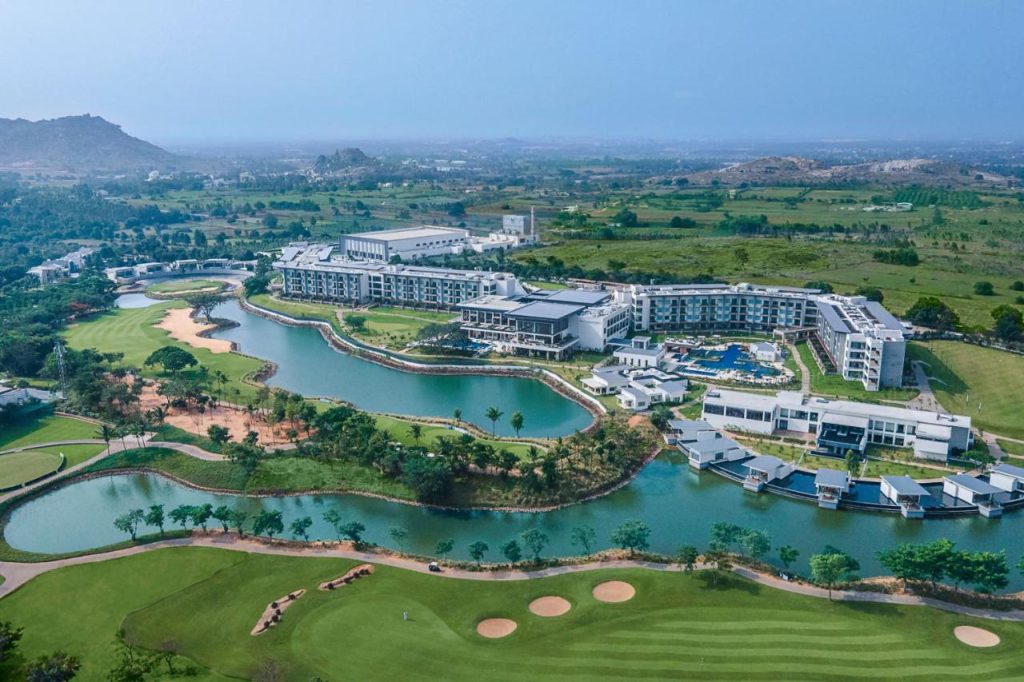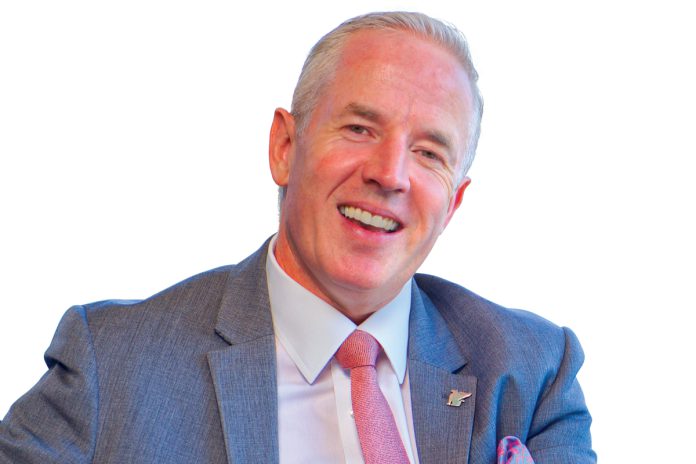Greens never looked as good as they do at the JW Marriott Bengaluru Prestige Golfshire Resort & Spa, to putt it mildly
Words by Sakshi Dhingra
To lay eyes on the JW Marriott Bengaluru Prestige Golfshire Resort & Spa is to be transported back to the Bengaluru of yore. Imagine verdant greenery stretching as far as the eye can see, melting into azure skies on the horizon, and the landscape dotted with crystalline lakes. It is a breathtaking combination, one that is a far cry from the hullabaloo of present-day Bengaluru. Little wonder then that this award-winning property is a darling of many.

I catch up with Ronan Fearon, General Manager of this little slice of luxe in addition to Mulberry Shades Bengaluru, Nandi Hills and Moxy Bengaluru Airport Prestige Tech Cloud. Grab a seat and dive into our freewheeling conversation
As someone overseeing multiple properties, how do you maintain a consistent leadership approach while adapting to the unique needs of each hotel?
I think it requires balancing a unified strategic direction with tailored, property-specific management. At JW Marriott Bengaluru Prestige Golfshire Resort & Spa, Mulberry Shades, and Moxy Bengaluru, each hotel has its own distinct identity and market focus, which necessitates tailored operational strategies, so our approach is to provide a shared vision while allowing flexibility in daily operations.
While we focus on the individuality of each hotel, consistency is achieved through strong leadership in key areas like Finance, Human Resources, and Sales & Marketing. These strategic leaders ensure that core values, service standards, and operational goals align across all properties. At the same time, each hotel’s operations are managed locally by unique leadership teams who are empowered to make decisions that reflect the specific needs of their guests and market.

For instance, JW Marriott Bengaluru Prestige Golfshire, being a luxury resort near the airport, often hosts large-scale events, and its operations are supported by Mulberry Shades and Moxy Bangalore when needed. However, outside of special events, each hotel runs its own strategy, ensuring a personalized experience for its guests while maintaining the brand’s overall excellence. This balance of centralized leadership and operational flexibility allows us to adapt to the unique demands of each property while delivering consistently high service levels across all hotels.
What do you see as the biggest challenge facing the luxury hotel sector in the next 5 years, and how are you preparing your properties to address it?
I believe the luxury hotel sector has tremendous opportunities for growth in the coming years, driven by a rising middle class and increasing discretionary income. Trends like sustainable travel, privacy, and the growing demand for personalization further expand possibilities in the luxury segment.
However, the dynamic nature of the hospitality industry will present some challenges over the next five years. Two key areas will require significant attention.

First, adapting to ever-evolving guest expectations is crucial. Today’s travelers seek more than just a place to stay—they want immersive, personalized experiences that reflect local culture and prioritize sustainability. Meeting these expectations while maintaining operational efficiency can be a challenge.
Second, talent acquisition and retention will remain pressing issues, especially as the demand for skilled professionals capable of delivering luxury-level service grows. To address this, we must invest in training and development to retain top talent and build strong pipelines for future leaders.
How has your approach to business strategy evolved in response to the changing travel landscape, particularly in the wake of global events affecting the hospitality industry?
The global pandemic has significantly reshaped our business strategy, emphasizing the need for flexibility and adaptability. While revenue remains important, our focus has shifted to prioritize guest safety, personalized experiences, and sustainability. The integration of technology has become essential, with contactless services, virtual event capabilities, and mobile solutions now at the core of our operations. We’ve also recognized the growing importance of domestic tourism and staycations, adjusting our offerings to cater to these changing travel patterns.

However, one thing that remains unchanged is the importance of personal connection. Guests increasingly seek meaningful, human interactions during their stays. Technology helps us maintain guest preferences, enabling us to tailor their experience—for instance, a guest’s preferences may vary when traveling for work versus leisure. By leveraging this data, we can enhance the personalization of each stay.
Additionally, the definition of luxury is evolving, especially for new-age travelers who seek unique, immersive experiences. As the luxury landscape changes, we continue to explore diverse revenue streams while excelling in catering to different types of guests. Ultimately, while our properties are visually stunning, what truly resonates with guests is not just the product, but the personalized service and memorable gestures from our team that make their stay truly exceptional.
With the rise of alternative accommodations like Airbnb, how are you positioning your hotels to offer unique value propositions that can’t be replicated by these competitors?
The rise of platforms like Airbnb has encouraged us to emphasize what sets hotels like JW Marriott Bengaluru Prestige Golfshire apart. Our key differentiator is the personalized service and curated luxury experiences that Airbnb simply can’t match. We provide a consistent level of service, safety, and comfort, complemented by world-class amenities such as fine dining, luxurious spas, and immersive experiences. These, along with our elegant rooms and villas, allow guests to relax and indulge in ways that alternative accommodations can’t replicate.

Additionally, as part of the Marriott network, we have the advantage of a loyal customer base. By tracking guest preferences, we personalize each stay, making it more comfortable and tailored to individual needs. My own recent experience with Airbnb underscored the importance of human interaction in hospitality. While alternative accommodations offer local experiences, they often lack the personal touch that creates emotional connections. By focusing on personal connect and exceptional service, we position our hotels as a welcoming haven where guests truly feel valued.
What emerging technologies or innovations do you believe will have the most significant impact on the hospitality industry, and how are you implementing them across your properties?
Emerging technologies like mobile check-in, contactless services, and guest preference tracking are transforming the hospitality industry. At our properties, we’ve implemented mobile check-in and digital concierge services long ago to enhance convenience and streamline the guest experience. We’re also leveraging technology to offer personalized in-room entertainment and mobile apps that allow guests to communicate with the hotel in real-time.

Our newest hotel Moxy Bengaluru even has an AI Robot guest service showcasing innovative approach to futuristic hospitality. We believe the future of hospitality lies in anticipating guest needs through data and delivering seamless, tailored experiences—and we are already embracing these innovations to ensure that our guests enjoy a frictionless and memorable stay without losing the personal connect.
As sustainability becomes increasingly important to travellers, what initiatives have you implemented or plan to implement to make your hotels more environmentally friendly without compromising on luxury?
As sustainability becomes a growing priority for travelers, we are committed to integrating eco-friendly practices across our properties without compromising on the luxury experience. At all our hotels we have taken a proactive approach by implementing several initiatives aimed at reducing our carbon footprint and promoting responsible tourism.
We have installed EV charging stations, encouraging the use of electric vehicles among our guests and associates. Additionally, we use water recycling systems to minimize water waste, and our in-house JW Garden allows us to source fresh produce for our kitchens, reducing the need for transportation and supporting farm-to-table dining. We also prioritize local sourcing wherever possible, further cutting down on our carbon footprint.

To minimize waste, we have transitioned to biodegradable packaging and eliminated single-use plastics. Energy efficiency is another key focus, and we’ve upgraded our lighting to energy-saving LED lights across the property, along with motion-sensor taps to conserve water. We’ve also embraced digitization, moving many of our processes online to significantly reduce paper usage.
These initiatives not only align with our sustainability goals but also enhance the overall guest experience, ensuring that luxury and environmental responsibility go hand in hand. By integrating sustainability into our operations, we strive to create a lasting positive impact on both the environment and our guests.


